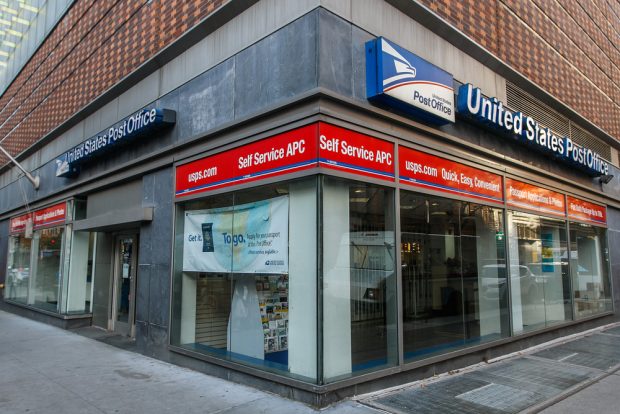 New York City U.S. Post Office branch (Image: Shutterstock).
New York City U.S. Post Office branch (Image: Shutterstock).
Although the topic was barely mentioned during a five-hour House hearing Wednesday, it appears that postal banking is back on the table as Congress and the United States Postal Service begin the process of overhauling the service.
Postmaster General Louis DeJoy told the House Oversight and Reform Committee that he is developing a long-term plan to make the Postal Service profitable. He said that plan is likely to be released in March.
Recommended For You
And Committee Chairwoman Carolyn Maloney (D-N.Y.) said she is seeking a bipartisan agreement on ways to make the service self-sufficient. She said she hopes that effort will result in bipartisan legislation.
In the closing minutes of the hearing, Rep. Ayanna Pressley (D-Mass.) said that postal banking could provide financial help to the service and help serve people who otherwise do not have access to traditional financial services.
DeJoy told the committee that the service lost $9.2 billion in FY20, adding to the losses of $66.8 billion during the past decade. DeJoy and Maloney agreed that proposals such as changing postal employee health care programs alone will not make the service profitable.
And while postal banking was not a large topic of Wednesday's hearing, CUNA President/CEO Jim Nussle this week urged committee leaders not to use postal banking as a way to help solve the financial crisis.
"Credit unions adamantly support and are diligently working towards the goal of expanding banking access, but we have grave reservations about proposals to leverage the United States Postal Service to provide banking services well beyond the Postal Service's core competencies," Nussle wrote.
Advocates have said that postal banking could provide financial services to the underserved. But Nussle said that if allowed, credit unions could provide those services if they were not burdened by field of membership constraints.
"Stated more bluntly, credit unions are currently required to refuse banking services to many underbanked individuals and underserved communities who are not in their field of membership," he said.
However, Postal Service Inspector General Tammy Whitcomb said she believes that there are opportunities for the service to provide additional services, such as non-bank financial services.
"By leveraging its extensive reach, the Postal Service can both increase revenue and provide valuable services to the American public," she said.
She added that any new service should produce enough revenue to cover its costs and make a contribution to institutional costs. In addition, she said, any new service should not negatively impact mail service.
Kevin Kosar, a resident scholar at the American Enterprise Institution, told the committee he is skeptical that postal banking would work efficiently.
"There likely is no non-postal business where the USPS could enter it and reap sufficient profits to make a significant improvement to its bottom line — including banking," he told the committee.
© Touchpoint Markets, All Rights Reserved. Request academic re-use from www.copyright.com. All other uses, submit a request to [email protected]. For more inforrmation visit Asset & Logo Licensing.






